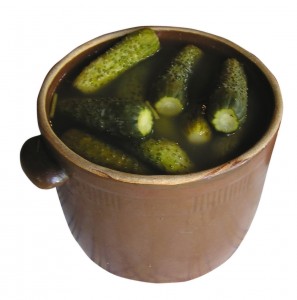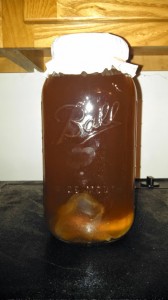Do It Yourself: Make Your Own Probiotic Foods
I have taken probiotics for many years. I have also eaten and made yogurt for many years. I had also eaten lacto-fermented pickles and dairy kefir, but I had not made them or other fermented foods, with the exception of yogurt, until recently. I found a delicious and relatively inexpensive source of healthy probiotics in these foods.
Two years ago I decided to try my hand at making lacto-fermented pickles, sauerkraut, and other vegetables. I went to the internet to learn how. I found that the process is very easy, and that the resulting fermented products were very tasty. The fact that they are teaming with healthy lactobacillus bacteria (probiotics) is a wonderful side benefit. I was hooked! I later learned to make lacto-fermented salsa and cranberry relish and pickled about every vegetable I could get my hands on. Almost all of them turned out great.
I have also learned to make dairy kefir (with both cow’s milk and goat’s milk), water kefir, and kombucha. I have also made a few cheeses: kefir cheese, soft cheese, kefir cottage cheese, and feta. I cannot wait to learn how to make many more types of cheese and other fermented foods.
It has been wonderful to find foods that are not only delicious and easy to make (with a few exceptions), but that are also extremely health-promoting, mainly due to their live probiotic content. I know of the importance of probiotics to gut health and that gut health is very important to a strong immune system, so eating these foods is good for our health. I hope to share some of what I have learned about probiotic-containing foods and their benefits and recipes and directions for making some probiotic foods and beverages, as well as resources I have found for information about fermented foods and how to make them.
I hope you will find this information interesting and useful and that you will share your experiences and knowledge. Please share your comments and questions below. I look forward to hearing from you. Thank you for visiting.
Tips for Successful Fermentation
Fermentation is a very easy process in most cases. There are some things you can do (and often must do), however, that will make your end products more successful and tasty, as well as safe.
- Be absolutely certain that everything you use is very CLEAN. This includes your jars or other fermentation vessels, your hands, work surfaces, cutting boards, knives and other utensils, fermentation weights and airlocks, etc. You want to encourage the growth of the good bacteria that does the fermentation (usually found on the produce itself or that is intentionally added) and creates the probiotics and not include other bacteria that could compete with or overtake the good bacteria. The salt solution of most lacto-ferments is not conducive to most bad bacteria, but you do not want to introduce extra undesirable bacteria due to poor sanitation.
- If you have more than one ferment going at the same time, make sure to keep each one at least five feet away from any other one. This helps to prevent cross-contamination. You do not want your kombucha crossing with your sauerkraut or sourdough, for example.
- Make sure you keep your ferments covered to keep out dust, insects, etc. For most this means covering with something breathable like a cloth napkin, paper towel, or coffee filter, secured with a rubber band. For some you cover them with a lid, especially if doing a second fermentation on kombucha, water kefir, or milk kefir, or if refrigerating.
- If covering with a tight lid without an airlock at room temperature, be sure to release the gas pressure occasionally. Otherwise you could have an explosion. I have only had this happen once, and it was with a second fermentation of water kefir with fruit juice added in a grocery store flip-top bottle. It was not fun to clean up. Luckily no one was nearby when it exploded. I use stronger bottles now and “burp” the bottles occasionally during the second fermentation and when making other ferments with a tight-fitting lid that does not have an airlock.
- Use care when opening bottles of fermented beverages that have built up carbonation, such as water kefir that has gone through a second fermentation. It very often overflows the bottle like champagne upon opening. Open covered with a towel and over the sink in case it fizzes over. Wardeh Harmon of GNOWFGLINS.com suggests placing the bottle in a bowl and holding another bowl over the top while opening so that anything that overflows will be caught in the bowl at the bottom. (See the GNOWFGLINS Fundamentals eCourse, Lesson 9, Water Kefir for this tip and more.)
- If a fermented product looks and/or smells bad, it probably is. If you are in doubt about it’s safety, throw it out and start again. Your ferments should often have a very sour taste and sometimes smell, and some will have a yeasty smell and taste, such as with water kefir that ferments a long time, but they should not smell spoiled or putrid. The smell and taste will often be strong but should not seem spoiled. Some ferments that have been in the refrigerator for a long time, such as fermented vegetables that have been stored for longer than one or two years, may not taste as fresh and good as they did when fresher, but they are probably not spoiled. The fermentation continues to occur at a slower rate in the refrigerator. When a fermented vegetable no longer tastes appealing, I throw it out (but they usually do not last that long before being eaten).
- DO NOT USE water that contains chlorine or fluoride in your ferments. This will inhibit the fermentation, as it could kill the desirable bacteria that are needed for the fermentation process. It is best to use filtered or good quality spring water.
- Do use the best produce you can find. Organic is best, both because it is healthier for you and because the chemicals used on conventional produce may inhibit the fermentation process.
More tips to come…
By Tia Lee
 DIY Probiotic Foods
DIY Probiotic Foods



Hi Tia,
Back home, we like to ferment stuff too, like fish, boar, wild mangos, etc. I never knew the benefits of eating them but I sure love them more than the McD or other type of fast food. I’ll be coming and sharing this site to my gardening friends. I’m sure they will learn something from you too. Thanks for all the tips. Be back for more.
Jenn
Hi Jenn,
I would love to taste some of those fermented dishes. I am sure they are delicious! I am glad you found some beneficial information here. Thank you for sharing my site with your friends. You are very welcome for the tips. I am glad you liked them. I hope you will enjoy my future posts.
Tia
You’re most welcome, Tia. And I definitely enjoy coming here. Always something new. You have a great day/weekend. Take care.
Thank you, Jenn. I am glad you enjoy the website. Thank you for visiting. You have a great day and weekend, too. Take care.
Wow Thanks for all the great info. I never knew it could be so healthy for your gut health eating fermented foods. Im curious on how a lot of those dishes would taste. I will try anything at least once.
Have a great day!
I am glad you found the information helpful. Yes, fermented foods are very healthy for our gut. Gut health is key to digesting and absorbing food and nutrients, as well as where most of our immune system is. I really like fermented foods. They tend to have a sour flavor, but you can often add other flavors and ingredients to them. Thank you for stopping by, and I hope you try some fermented foods! I hope you have a great day, too!
Hello. I am glad you found the information useful. Yes, fermented foods are very healthy for our gut. Gut health is very important for efficient digestion of food and absorption of nutrients, and it is also where much of our immune system is located. Thank you for stopping by, and I hope you try some fermented foods. I think you will like them, and I know they will be good for you! Have a wonderful day!